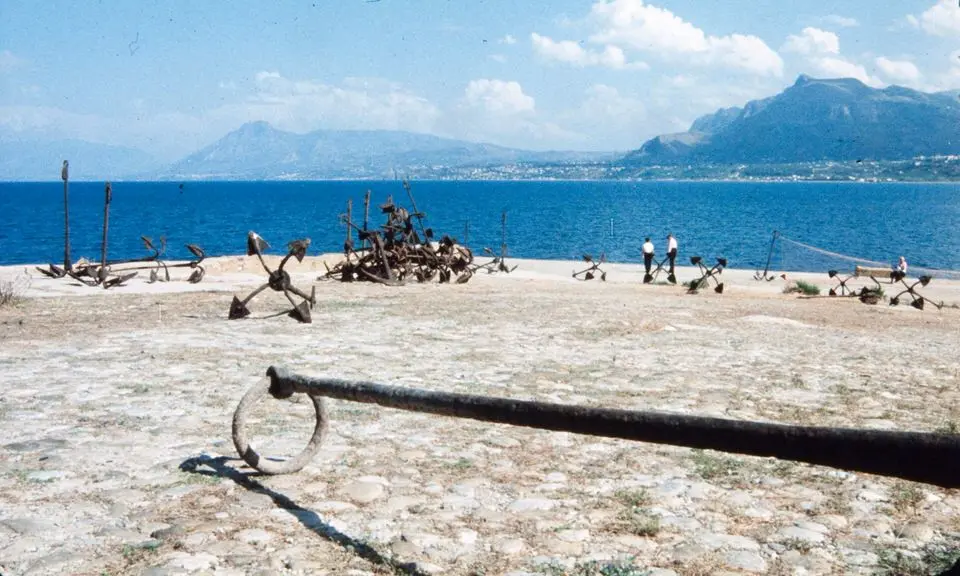

Totò’s car drives down Via del Corso in Rome heading away from the Vittoriano and Piazza Venezia. Before reaching home and learning about an event that will send him back in time, he drives past Terme di Caracalla. His story actually begins very far away in Giancaldo, an imaginary town in Sicily which takes its name from the mountain that looms over Bagheria, Tornatore’s birthplace, and where, during WWII, the only distraction for residents was the cinema. Giancaldo was created through a combination of various locations. Village life takes place primarily in Piazza Umberto I in Palazzo Adriano (PA) which is dominated by a 17th century octagonal fountain and overlooked by the Church of Maria Santissima Assunta where nearby women prepare astrattu, tomato concentrate. The fictional cinema that gives the film its title was created in via Nino Bixio; and the Church of Maria Santissima del Lume provides the setting for Alfredo’s funeral.
Totò lives with his mother and younger sister and waits for his father who is missing in Russia, to return home. Very soon Totò and his mother are called in by the military authorities who confirm the man’s death. After receiving the news, they walk out of a building in Largo Cavalieri di Malta, Palermo and then walk down a road, apparently damaged by war, in Ruderi di Poggioreale (TP), a village which was actually destroyed by the 1968 earthquake in the Valley del Belice. Totò goes to school in the Castello dei Ventimiglia in Castelbuono (PA), while the summer cinema screenings are held near Porta Marina, in Cefalù (PA). Here, now separated from Elena, Totò is screening the epic Ulysses starring Kirk Douglas when a thunderstorm surprises them and the audience, seated on Molo Vecchio, races for cover. On his return from the army, Totò takes Alfredo out to sea in Solanto, Santa Flavia (PA).
Totò sets off for Rome from the old station of Lascari (PA): it will take him 30 years to finally decide to return to his birthplace.
Totò’s car drives down Via del Corso in Rome heading away from the Vittoriano and Piazza Venezia. Before reaching home and learning about an event that will send him back in time, he drives past Terme di Caracalla. His story actually begins very far away in Giancaldo, an imaginary town in Sicily which takes its name from the mountain that looms over Bagheria, Tornatore’s birthplace, and where, during WWII, the only distraction for residents was the cinema. Giancaldo was created through a combination of various locations. Village life takes place primarily in Piazza Umberto I in Palazzo Adriano (PA) which is dominated by a 17th century octagonal fountain and overlooked by the Church of Maria Santissima Assunta where nearby women prepare astrattu, tomato concentrate. The fictional cinema that gives the film its title was created in via Nino Bixio; and the Church of Maria Santissima del Lume provides the setting for Alfredo’s funeral.
Totò lives with his mother and younger sister and waits for his father who is missing in Russia, to return home. Very soon Totò and his mother are called in by the military authorities who confirm the man’s death. After receiving the news, they walk out of a building in Largo Cavalieri di Malta, Palermo and then walk down a road, apparently damaged by war, in Ruderi di Poggioreale (TP), a village which was actually destroyed by the 1968 earthquake in the Valley del Belice. Totò goes to school in the Castello dei Ventimiglia in Castelbuono (PA), while the summer cinema screenings are held near Porta Marina, in Cefalù (PA). Here, now separated from Elena, Totò is screening the epic Ulysses starring Kirk Douglas when a thunderstorm surprises them and the audience, seated on Molo Vecchio, races for cover. On his return from the army, Totò takes Alfredo out to sea in Solanto, Santa Flavia (PA).
Totò sets off for Rome from the old station of Lascari (PA): it will take him 30 years to finally decide to return to his birthplace.

Cristaldi Film, Films Ariane
A famous film director remembers spending his days as a child in the cinema theatre of his little town in Sicily with the projectionist, Alfredo, who taught him the profession and also passed on his love for film.